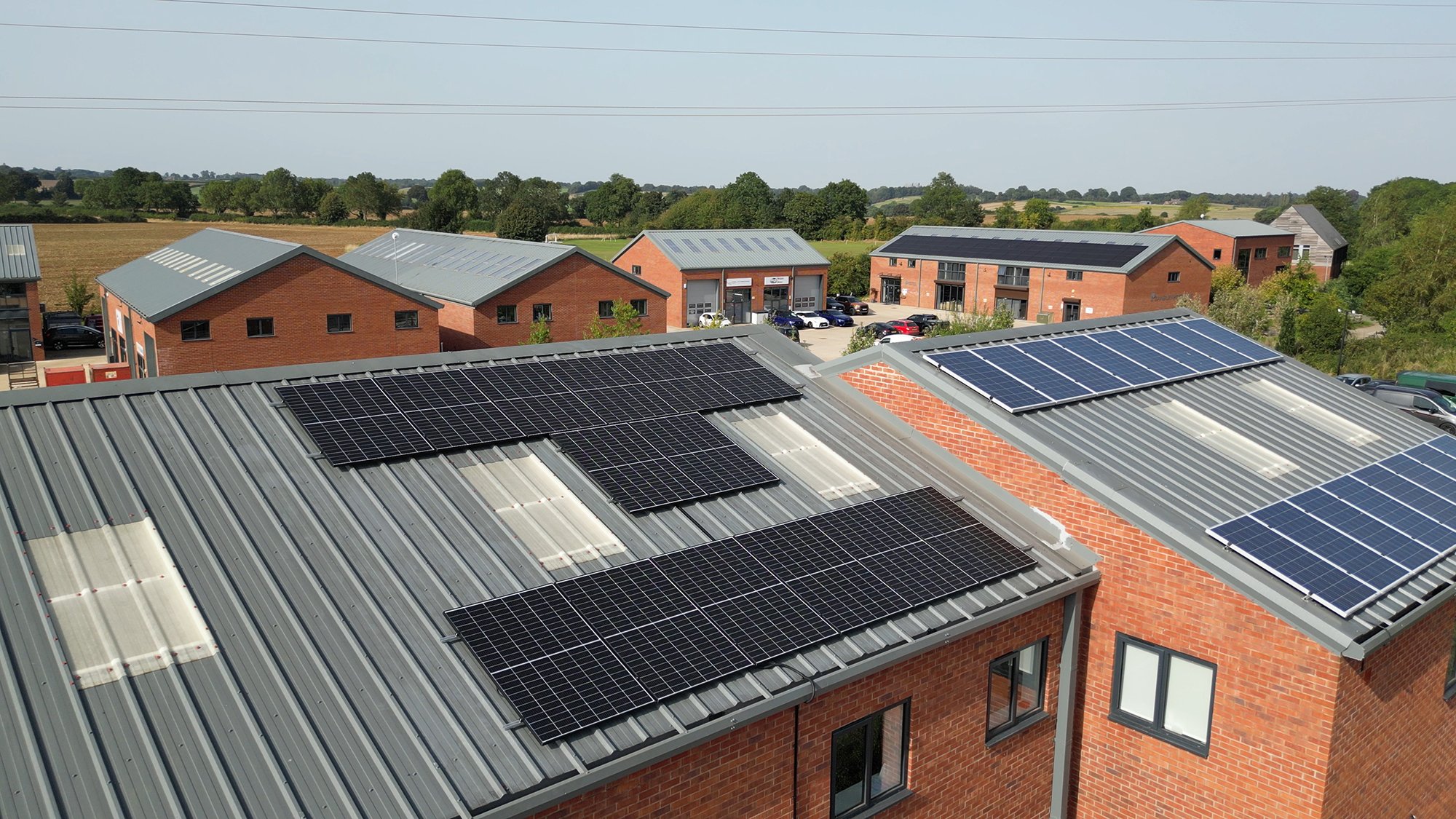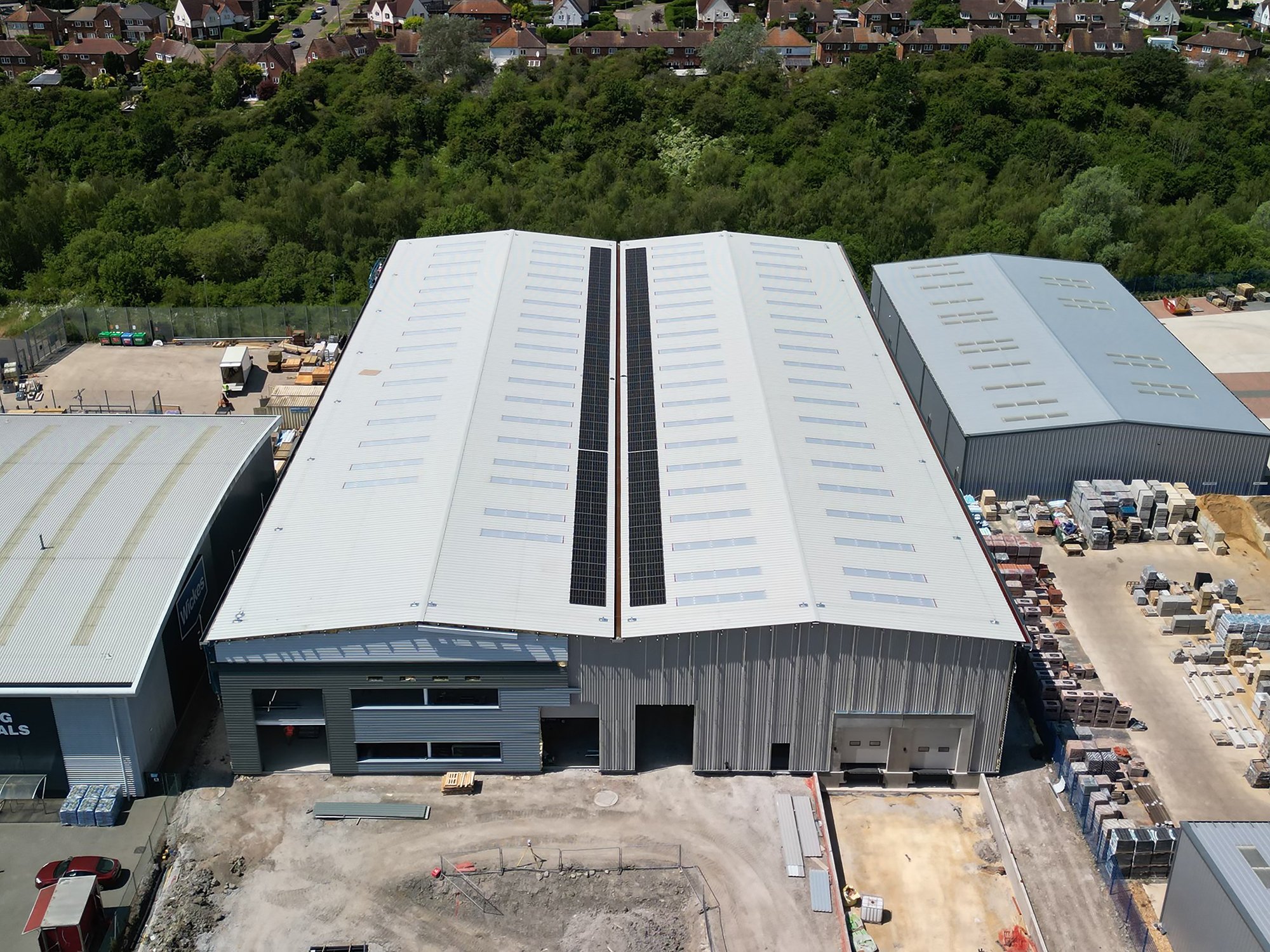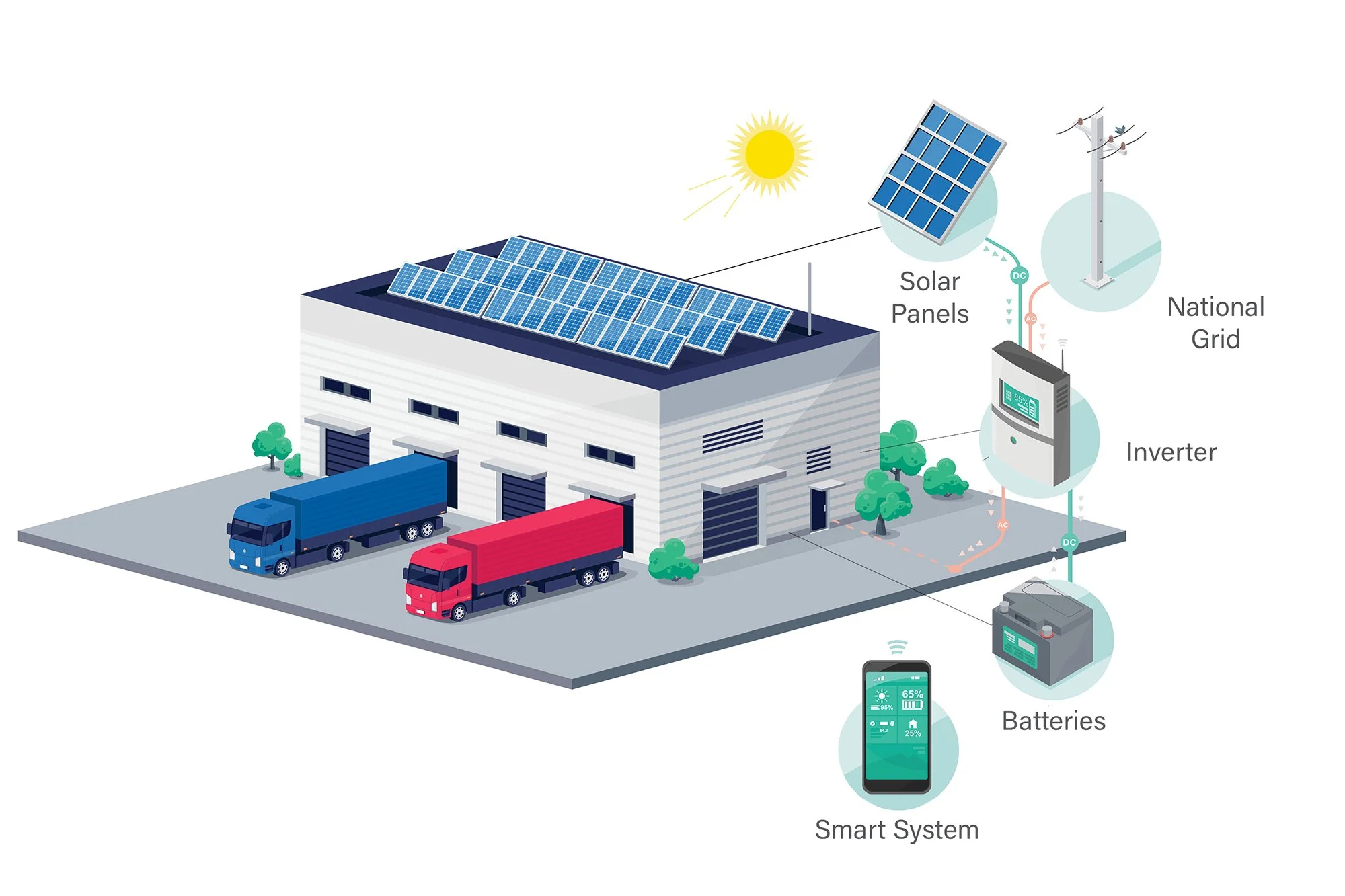Commercial Solar Energy
Our experienced in-house team of engineers specialise in fitting commercial solar photovoltaic (PV) systems designed to meet the high energy demands of modern businesses, that not only significantly reduce energy costs but also lower your company's carbon footprint.
Our commercial solar PV installations are ideal for businesses of all sizes, from small enterprises to large industrial facilities.
For more information or to get a bespoke quote for your business, contact our solar experts today.
Transform your Energy Use
The lifetime cost per kWh from commercial solar PV systems, can be as low as 4p per kWh, while electricity from the grid currently costs approximately 24.5p per kWh. This makes solar energy solutions an excellent investment for any business with a decent roof or plot of land and a long-term intention to stay in their premises for 5+ years - but how can we help you achieve this?
-

Reduced Energy Bills
We can help you significantly reduce your monthly electricity bills by up to 80%, by designing the right system for your energy usage.
-

Return on Investment
Your ROI can be seen within 3-5 years as system payback periods have shortened with improvements in technology and reductions in cost.
-

Tax Incentives
We can advise you on government incentives, such as tax credits, accelerated depreciation, and rebates, plus 0% VAT on solar batteries.
-

Sustainability Goals
Our solar PV solutions will enhance your company’s corporate responsibility profile and help you meet your CSR objectives.
Contribute to the national net zero target
The UK government has set a target for the country to achieve net-zero emissions by 2050. By investing in a commercial solar panel installation, your business can contribute to the reduction of greenhouse gas emissions. We will design and install your commercial solar system to ensure optimal efficiency and maximum energy production.
Commercial Solar PV System
Solar Panels: Our commercial installations use higher wattage panels (up to 500W per panel). These panels are more efficient in converting solar energy and ideal for maximizing space.
Inverter Technology: We use advanced inverters to convert the DC output from solar panels into AC power that can be used directly in office buildings, manufacturing plants, or fed back into the grid.
System Capacity: We offer systems ranging from 20kW for small businesses to multi-megawatt installations for large industrial operations.
Energy Output: A typical 50kW system can generate around 45,000 kWh per year, which can substantially offset energy usage.
Mounting Systems: We use durable racking solutions for roof or ground-mounted systems.
Monitoring Systems: We provide real-time data on the performance of the solar panels, helping to optimize output and maintain the system effectively.
Installation: Our MCS approved solar PV installers ensure a seamless integration of solar systems with minimal disruption to daily operations, including rooftop and ground-mounted options.
Our Latest Commercial Solar Energy Projects
-

Community Centre
Location: Bicester
System Size: 6 kWh system
Solar panels: 16x Trina Vertex S+ 430W Dual Glass
Inverter: Huawei 6kW M1 3ph
Battery: Future proofed for a hybrid inverter
-

Banbury Business Park
Location: Banbury
System Size: 6 kWh system
Solar panels: 14 x 425w Trina Vertex panels
Inverter: Huawei 6 kWh
Battery: 5 kWh expandable up to 30 kWh.
-

Corby Warehouse
Location: Corby
System Size: 70 kWh system
Solar panels: 172 x 410w Ja
Inverter: Rayleigh 70 kWh
Commercial Solar Panel FAQs
-
Commercial solar is the use of solar energy to fulfil the energy needs of a business. Compared to residential systems, commercial solar panels are typically larger to absorb more light, and generate more energy to meet the higher demand of businesses. When it comes down to solar panels for businesses, in most cases the larger the panel the better. Whereas on domestic properties there tends to be greater space limitation.
Commercial solar panels can be used to power both industrial processes and offices. Switching to solar energy is a fantastic way to reduce your business’s carbon footprint and energy bill. Although there are several different types of commercial solar panels, the most commonly installed systems use either Monocrystalline or Polycrystalline panels.
-
Most businesses are active during the daytime, which means they are likely to consume all the energy their solar panels generate. If your rooftop is large enough to generate more electricity than your company is consuming, and your work operates outside the usual 9-5, a solar battery is viable. It all depends on your energy requirements and we can tailor a system designed for your business.
-
With a renewed focus on the UK’s commitment to reaching Net Zero, there are always new schemes and grants arising to encourage the use of low-carbon technologies such as Solar PV. Current grants and incentives for the installation of commercial solar panels:
Low Carbon Workspaces – The Low Carbon Workspaces grant helps businesses lower their carbon emissions and energy bills, by offering grants of up to £5,000 to invest in carbon-saving upgrades. This could be for the installation of solar panels, battery storage, insulation, or even LED lighting. Grants are available for Small to Medium Enterprises based in Berkshire, Bedfordshire, Buckinghamshire, Hertfordshire, Milton Keynes and Northamptonshire.
Power Purchase Agreement – A Solar PPA or Power Purchase Agreement allows an investor to pay and maintain the Solar PV at the commercial site. This would mean there is no upfront cost for the business using the site, yet they will be able to buy the Solar electricity from the investor at a cheaper rate than the National Grid.
-
Business premises and community buildings are usually exempt from requiring planning permission. Even ground-mounted systems can be installed under ‘permitted development’. However, there are a few rules that must be followed in order to be exempt:
Commercial solar panels need to be installed in a manner that minimises the impact of the overall building and general area’s appearance.
Flat roof solar installations must be less than 1m above the highest part of the roof. Excluding chimneys.
Roof-mounted installations are not permitted to protrude by more than 200mm from the roof’s surface.
Roof-mounted solar panels must be installed further than 1m away from the edge of the roof or wall joint.
In designated areas such as Areas of Outstanding Natural Beauty, no solar panels are permitted to be installed on a wall or roof slope which faces a road.
A ground-mounted solar installation, must not be larger than 9m2.
You will need to gain planning permission if your solar panels are going to be installed on a building or property site that is of historical interest. This includes listed buildings, ancient monuments or world heritage sites. Prior approval is also required by the local planning authorities for any solar PV system greater than 50kW.
-
The overall price of a commercial installation will depend on the size of the project, your energy usage, and if you require any extras, such as solar batteries or a fleet of EV Chargers. We offer a bespoke service and tailor a package to suit your needs and your budget, including figures for your return on investment figures.
Grants, government schemes and Solar Panel Finance options make commercial solar viable for all businesses wanting to be green.

Next Steps
-
Assessment
We evaluate your site's solar potential including roof space, shading, and electrical infrastructure.
-
System Design
Tailored design to maximize energy production and meet the specific energy demands of your business.
-
Permits
We handle all necessary permits and documentation required by local authorities and utility companies.
-
Installation
Our own MCS certified engineers ensure safety and compliance with industry standards.
-
Testing
Full system testing and activation, followed by ongoing support to ensure optimal performance.

